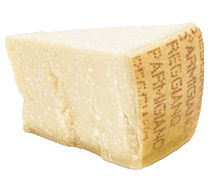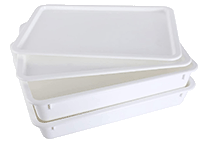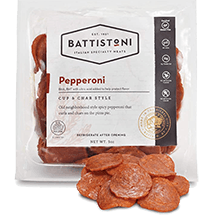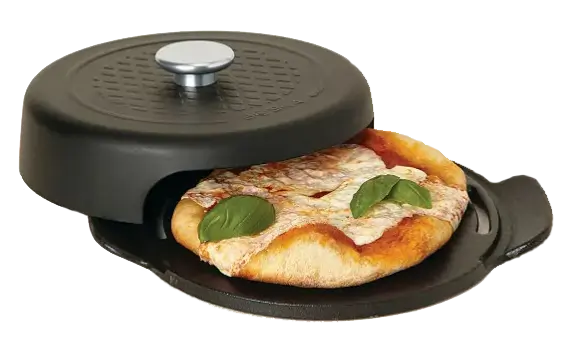Pizza and parmesan cheese go hand in hand. Every pizzeria worth its weight has a parmesan shaker on the table right next to the red pepper flakes and flavored olive oil or extra virgin olive oil.
Chances are you have some parmesan cheese in your refrigerator right now. It’s great on pasta, salad, soups, and pretty much anything. Parmesan cheese is an aged cheese and is good for longer than other cheeses, but have you ever wondered really how long does parmesan cheese last once open?
We took a deep dive into parmesan to find an answer to this question and learned a few things along the way, too! Call us the self-proclaimed parmesan experts.
Key Takeaways
- Parmigiano Reggiano is the original version with specific aging profiles and strict regulations, while Parmesan cheese is more widely available, and Grated Parmesan is a dehydrated, shelf-stable option.
- Properly storing Parmesan cheese is crucial for its longevity.
- Learn the signs that Parmesan cheese has turned bad, including visible mold (especially on grated cheese), a foul smell, clumping in grated cheese, and a sour taste.
Table of Contents
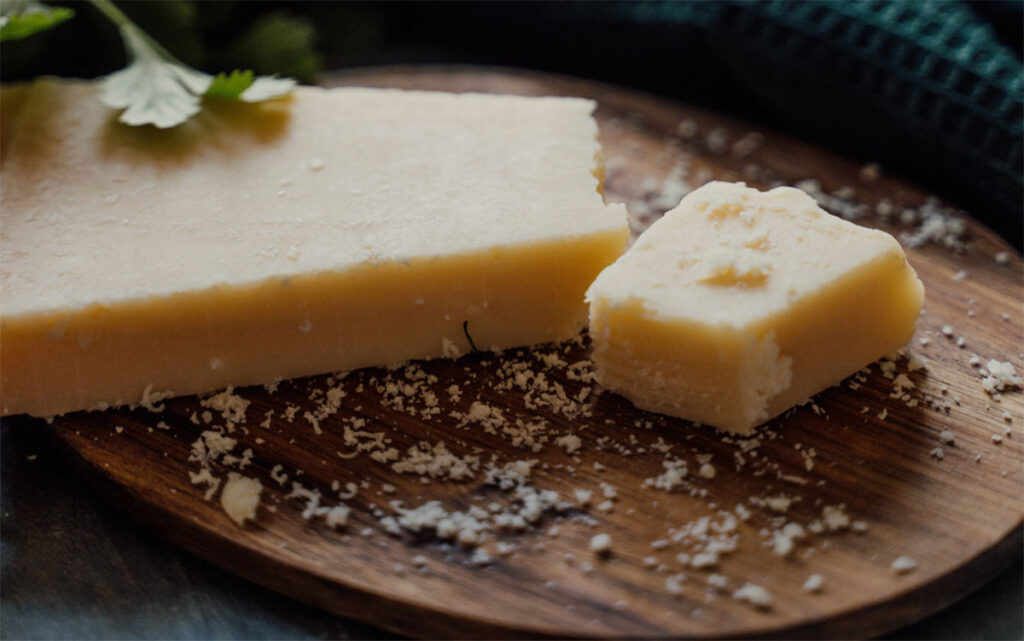
What is Parmesan Cheese?
Parmesan cheese, the classic Italian cheese, is hard, low moisture-aged cheese that adds a nutty flavor. Parmesan cheese comes in three varieties.
There is the classic original Parmigiano Reggiano, parmesan, and dehydrated parmesan cheese in a plastic bottle. Also, the term parmesan means something different in Europe than in the United States.
Three Varieties of Parmesan Cheese
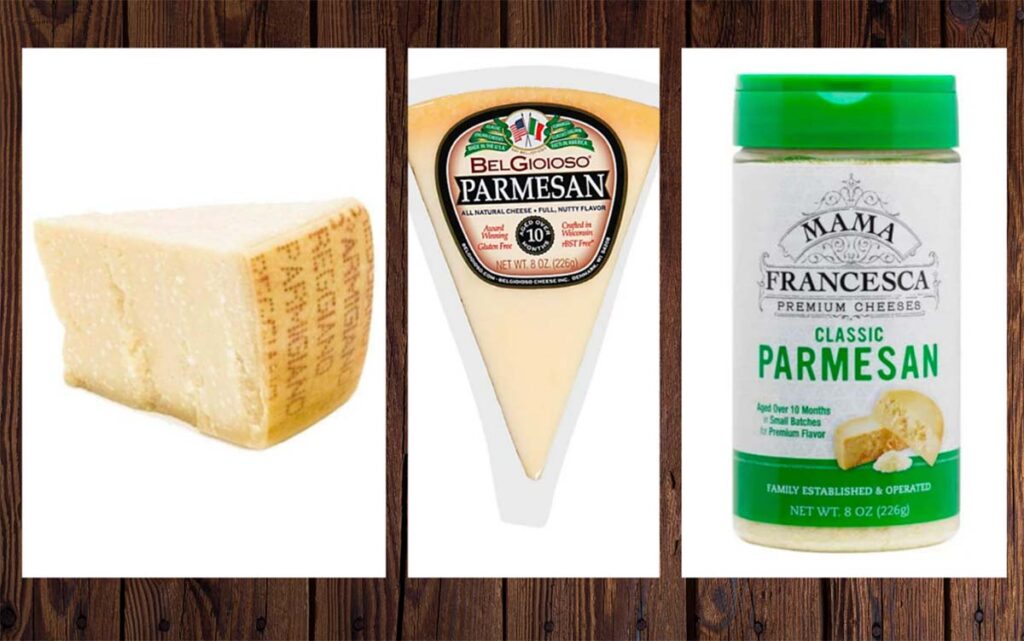
Parmigiano Reggiano
Parmigiano Reggiano is the original version of parmesan. It has a granular texture and hard rind. It is aged between 12-24 months but can be aged longer. It is named after the place that it comes from, the Northern region of Italy, the provinces of Parma and Reggio Emilia.
Parmigiano Reggiano is a protected designation of origin, just like San Marzano tomatoes need to have the DOP label. This means under Italian and European law, it has to be produced in the right regions in the traditional way to be considered Parmigiano Reggiano.
Because of its high quality and strict regulation, Parmigiano Reggiano is expensive, and you may have to take a trip to the specialty market to find it or order the best cheeses online. And be sure to have a high quality cheese grater on hand and take good care of it; we’ve had ours for years.
Parmigiano Reggiano is sold at four different age profiles:
- 12-18 months: Light flavor, crumbly texture
- 22-24 months: Grainy texture, nutty taste texture
- 30-36 months: More intense taste, grainy texture.
- More than 40 months: Dense and hard, complex taste.
Parmesan Cheese
Parmesan cheese is a cheese that is made with cow’s milk and must be aged for at least ten months. Other than that, there are no other rules it can be made anywhere. This cheese is more affordable and is probably in your local supermarket as you read this.
Grated Parmesan
Grated parmesan in the plastic bottle is a dehydrated parmesan that is shelf stable and the least expensive form. In recent years some manufacturers have come under fire for adding cellulose and wood filler to their products.
We regularly use both Parmigiano Reggiano and basic parmesan on our homemade pizza. We love the complexity and texture of Parmesano Reggiano, but it is expensive, so we use it in certain dishes where it really makes a difference. Since basic parmesan cheese is easier to find and more affordable, we use that too.
However, we avoid the grated parmesan in the plastic bottle like the plague. It’s literally inedible to our snobby “Italian” palates these days.
Let’s look at how to properly store parmesan cheese to get the most out of it.
How Long Does Parmesan Cheese Last Once Open
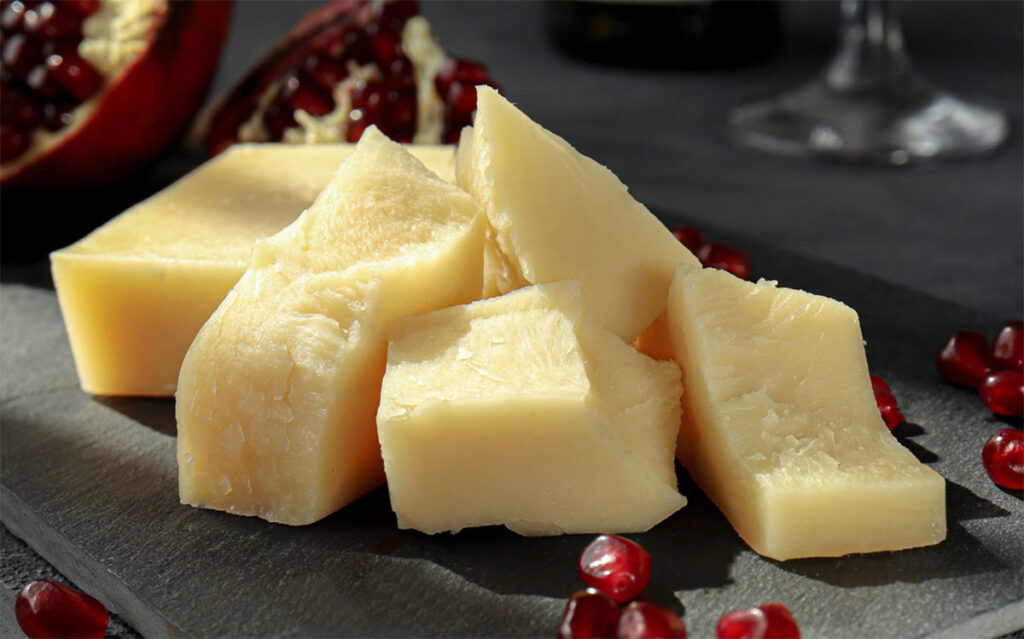
Let’s start with Parmigiano Reggiano, which is sold in blocks or wedges. It comes vacuum sealed and shelf stable for a few months. But after you open it, you will need to take a few extra steps to make sure that you get the most out of this decadent cheese.
You need to wrap it in butcher paper or wax paper and place it in an air-tight bag with all of the excess air squeezed out. Then it depends on the age of the cheese for how long you can keep it in the refrigerator.
How Long Does Parmigiano Reggiano Last?
Opened Parmigiano Reggiano, which is aged 12-18 months, is good for 15 days. So be sure to invite us over for family pizza night quickly.
Opened Parmigiano Reggiano, which is aged 24+ months, is good for one month. A few good weeks of pizza nights with authentic D.O.P. parmesan? Worth it.
How Long Does Parmesan Cheese Last?
Basic parmesan cheese sold packaged in the supermarket will have a best-by date. Always follow that as a guideline. Once the package is open, then it is good for one month.
How Long Does Freshly Grated Parmesan Cheese Last?
Freshly grated parmesan cheese, usually sold in little tubs or bags, has a much shorter life. Again follow the best-by date. But generally, once it is opened, it only lasts five to seven days in the refrigerator. That is because it has more air, causing it to break down faster.
How Long Does Dry Grated Parmesan Cheese Last?
Dry grated parmesan cheese sold unrefrigerated in those infamous plastic containers has a long shelf life. And once it’s opened, it should be kept in the refrigerator. It lasts around three month.
Is Parmesan a high temp cheese?
Parmesan cheese is generally considered a cheese that can withstand higher temperatures compared to some softer cheeses. Its hard and granular texture, along with its low moisture content, makes it suitable for grating and melting at higher temperatures. Parmesan is often used as a topping for pizzas and baked dishes, where it can be exposed to elevated temperatures without completely melting or losing its flavor.
However, while Parmesan can tolerate higher temperatures, it’s essential to note that excessive heat can still affect its texture and flavor. It’s best to incorporate Parmesan into dishes where it can complement the flavors and add a savory element, whether melted or sprinkled on top. If you’re using it in cooking or baking, be mindful of the cooking time and temperature to ensure the best results without compromising the quality of the cheese.
Signs Parmesan Cheese Has Turned Bad
If you are unsure if the parmesan in your refrigerator has gone bad, then there are a few ways to know whether you should use it or toss it, use your senses and common sense.
- Mold visible mold on the cheese can be cut off, but mold on grated cheese means it’s time for the trash bin.
- Smell dairy products, in general, will have a foul odor when they are past their prime. A quick sniff is usually all it takes to let you know whether that is going to make you sick or not.
- Texture clumping in grated cheese means it is bad.
- Taste if you get this far and still aren’t sure if the parmesan has gone bad; taste it. It will have a sour, foul taste.
Best Ways to Use Parmesan On Pizza

Freshly grated parmesan cheese is excellent on pizza. Here are a few of our favorite ways to use parmesan pizza.
- Blue cheese, walnuts, and honey.
- White pizza with Alfredo sauce.
- Mushroom, prosciutto, and arugula.
- California-style pizza with artichokes, shallots, and spinach.
- Sicilian pizza with anchovies, capers, and olives.
- Shrimp and asparagus.
- Connecticut clam pizza
- Sun-dried tomatoes, green olives, and jamon serrano.
Fun Fact: One excellent pairing to try is Parmigiano Reggiano with Proscuitto di Parma because Prosciutto di Parma is made from pigs that ate the leftover whey from making Parmigiano Reggiano giving it a unique taste. We want to visit the Parma region of Italy just to meet these pigs.
What is your favorite type of parmesan cheese?

